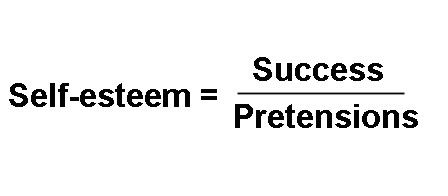According to William James, arguably one of the most insightful students of the mind, certainly since his own time, self-esteem can be represented as a fraction, with one’s pretensions in the denominator, and one’s actual successes in the numerator:
Thus, one can increase self-esteem either by increasing the numerator by increasing actual successes, or by decreasing one’s pretenses to greatness. It was James’s claim that both self-satisfaction (high self-esteem) and self-abasement (low self-esteem) are intimately related emotional primitives. The barometer of self-esteem could wax and wane seemingly due to various organic causes from day to day, but in non-pathological cases, it was overall subject to personal dispositions toward pretense and reality-based, objective outcomes.

